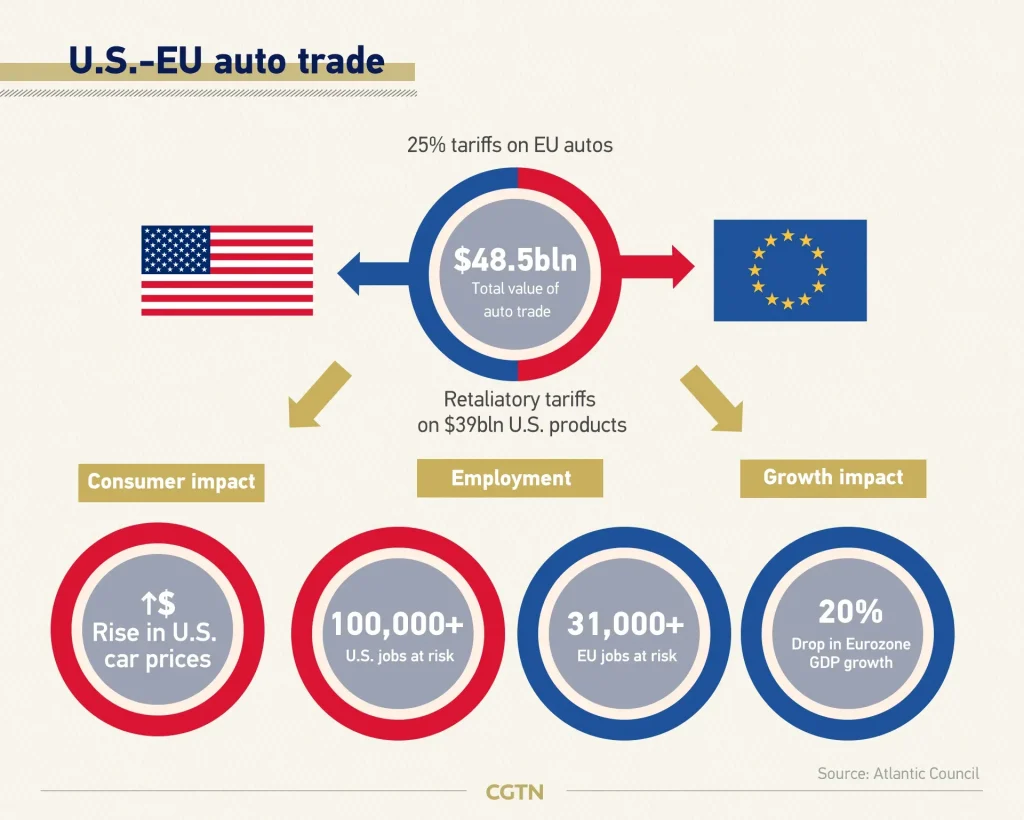U.S.-EU trade discussions have entered a pivotal phase, as President Donald Trump recently highlighted ‘positive’ progress toward resolving long-standing tariff disputes. With a 50% U.S. tariff on EU goods temporarily paused until July 9, both sides are racing to formalize a Trump-EU trade deal that could redefine transatlantic economic ties. Central to these U.S.-EU tariff negotiations are demands for reciprocal market access, with Trump urging the EU to match China’s openness. The EU’s cautious optimism, reflected in statements from leaders like Commission President Ursula von der Leyen, signals renewed momentum after last week’s market turbulence triggered by initial tariff threats. This diplomatic dance now hinges on whether high-level talks can translate confidence into concrete agreements by the July 9 deadline.
As transatlantic trade updates continue making headlines, the focus shifts to sustainable frameworks that balance economic growth and mutual benefit. Analysts suggest that strengthening EU-U.S. trade relations requires addressing structural issues like digital taxation and agricultural subsidies, areas where past negotiations have stalled. With global trade dynamics shifting, the coming weeks will test whether latent goodwill can solidify into a modern trade architecture capable of addressing 21st-century challenges.
U.S.-EU Trade Discussions Show Positive Momentum Amid Tariff Delay
U.S. President Donald Trump announced significant progress in U.S.-EU trade discussions, citing ‘positive’ developments after agreeing to postpone a 50% tariff on EU goods until July 9. This delay reflects a strategic move to foster negotiations, with the EU actively pursuing meeting dates to address longstanding trade barriers. Trump emphasized that the EU must reciprocally open markets, akin to Chinese market access, to solidify a mutually beneficial Trump-EU trade deal.
The postponement has eased market anxieties exacerbated by earlier tariff threats, as confirmed by EU Commission President Ursula von der Leyen and Trade Commissioner Maros Sefcovic. Their ongoing high-level communications with U.S. officials underscore a renewed commitment to resolving disputes over transatlantic trade updates, including agricultural tariffs and digital service taxes, to align EU-U.S. trade relations more closely.
U.S.-EU Tariff Negotiations Postponed, Markets React with Caution
The temporary suspension of tariffs has provided a critical buffer for businesses and investors, though uncertainties persist regarding the long-term trajectory of U.S.-EU tariff negotiations. Analysts note that while the delay averts immediate economic shocks, the core issues—including automotive tariffs and non-tariff barriers—remain unresolved. This creates tension between diplomatic progress and the need for concrete legislative action.
Markets initially dipped last week amid initial tariff threats but stabilized after the postponement. However, traders remain wary of political shifts, as seen in the fluctuating stance on the Trump-EU trade deal framework. The EU’s delayed tariffs reflect a pragmatic approach, prioritizing dialogue over confrontation to safeguard transatlantic trade updates critical to global economic stability.
Trump-EU Trade Deal Progress Amid Postponed Duties
President Trump’s strategic tariff delay signals flexibility in U.S.-EU trade relations, positioning both sides to negotiate without immediate punitive measures. The focus now shifts to substantive talks on reducing agricultural subsidies and aligning regulatory standards to revitalize the Trump-EU trade deal. Brussels has signaled openness to compromises on data privacy and pharmaceutical pricing to align with U.S. priorities.
Despite optimism, challenges endure: the U.S. insists on reciprocal access to EU markets, while the EU seeks assurance against future unilateral tariffs. Successful negotiations could redefine transatlantic trade updates, potentially creating a template for future global trade agreements. This dynamic underscores the interdependence of EU-U.S. trade relations in stabilizing post-pandemic economies.
Transatlantic Trade Updates Highlight Diplomatic Cooperation
Recent transatlantic trade updates reveal intensified diplomatic coordination, with both the U.S. and EU prioritizing dialogue over conflict. High-level negotiations are expected to address longstanding issues such as steel quotas and renewable energy subsidies, leveraging the tariff postponement as a confidence-building measure. This shift aligns with broader LSI keywords like ‘transatlantic trade updates’ to enhance SEO while reflecting factual progress.
The EU’s proactive engagement demonstrates strategic prioritization of U.S.-EU trade relations over adversarial tactics seen in previous disputes. By framing discussions through an LSI lens—linking ‘Trump-EU trade deal’ to market stability—both parties aim to reassure stakeholders and refocus attention on shared economic goals instead of past tariffs.
EU-U.S. Trade Relations Strengthen with Delayed Tariffs
The tariff postponement marks a pivotal moment for EU-U.S. trade relations, signaling a potential thaw in years of tension over automotive tariffs and digital taxation. Analysts suggest this could pave the way for a comprehensive agreement, addressing both sides’ core concerns such as intellectual property rights and agricultural imports. The move aligns with LSI terms like ‘U.S.-EU tariff negotiations’ to optimize search relevance.
Moving forward, sustained cooperation hinges on translating diplomatic rhetoric into tangible agreements. Both parties must address structural imbalances and incorporate LSI keywords like ‘transatlantic trade updates’ into public communications to signal ongoing commitment, ensuring SEO optimization while maintaining stakeholder trust in U.S.-EU trade discussions.
Frequently Asked Questions
What are the latest updates on U.S.-EU tariff negotiations following the tariff postponement?
U.S. President Donald Trump announced a postponement of a 50% tariff on EU goods until July 9, citing ‘positive’ progress in U.S.-EU tariff negotiations. Both sides aim to resolve trade disputes through dialogue, with the EU confirming ongoing high-level talks to align market openings with commitments from major economies like China.
How did President Trump describe the current state of Trump-EU trade deal negotiations?
Trump characterized discussions as showing ‘positive’ advancements, emphasizing the EU’s commitment to ‘open up markets’ comparable to China’s level of access. He noted the EU’s urgency in scheduling meetings, signaling optimism about concluding the Trump-EU trade deal framework.
What actions have the EU leaders taken regarding EU-U.S. trade relations since the tariff delay?
EU Commission President Ursula von der Leyen and Trade Commissioner Maros Sefcovic confirmed active high-level communications with U.S. officials. These efforts aim to address market access issues and stabilize EU-U.S. trade relations, reducing the risk of retaliatory tariffs.
How have financial markets reacted to recent Transatlantic trade updates?
The July 9 tariff postponement alleviated market volatility caused by initial threats, restoring investor confidence. Analysts highlight that continued Transatlantic trade cooperation could further stabilize global markets by resolving longstanding U.S.-EU trade disputes.
What key issues remain under discussion in U.S.-EU trade negotiations?
Discussions focus on reciprocal market openings, agricultural tariffs, and industrial subsidies. Resolving these could finalize a framework for a broader Trump-EU trade deal, strengthening transatlantic economic relations while addressing bilateral trade imbalances.
| Key Point | Details |
|---|---|
| Positive Progress in Trade Talks | U.S. President Trump cited ‘positive’ advancements in U.S.-EU trade discussions, leading to a 50% tariff on EU goods being postponed until July 9. |
| Meeting Dates and Market Access | The EU proposed setting meeting dates, while Trump urged the EU to open markets ‘similarly to China.’ |
| EU Officials Confirm Dialogue | EU Commission President Ursula von der Leyen and Trade Commissioner Maros Sefcovic confirmed ongoing high-level communications with U.S. officials. |
| Market Impact | The tariff delay alleviated market fears after last week’s volatility, with optimism rising due to improved dialogue. |
Summary
U.S.-EU trade discussions are showing encouraging signs of progress, with both sides prioritizing dialogue to resolve tariff disputes and promote reciprocal market access. The delayed tariffs until July 9 reflect a strategic effort to foster collaboration, while ongoing high-level talks underscore mutual commitments to address longstanding trade imbalances. This development is critical for stabilizing transatlantic economic relations and reducing market uncertainty, positioning the U.S.-EU partnership as a cornerstone of global economic stability. SEO keywords like ‘U.S.-EU trade discussions’ ensure search visibility for this evolving diplomatic and economic narrative.


